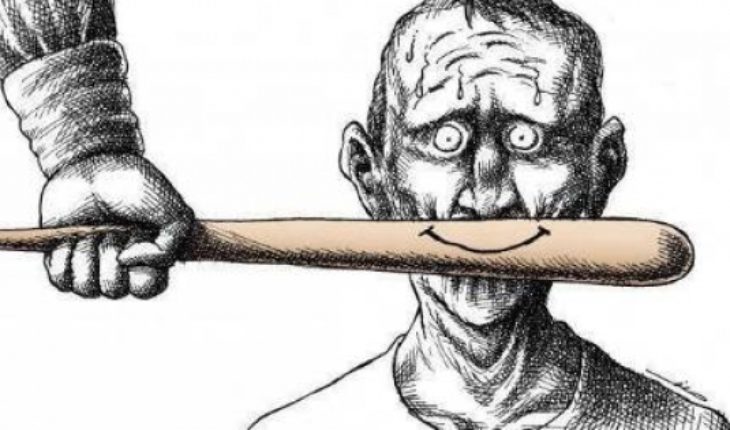often we forget that the right to vote was a popular conquest severely torn rulers; and that democracy, even in its representative model was won in a fight to death with a high cost in human lives. One hundred years of uprisings and revolutions in France ended in 1871 with the establishment of a Democratic Republic. For sample, in Argentina, between 1976 and 1983, the military dictatorship produced 30,000 dead and missing. In Chile, from 1973 to 1988, Pinochet makes disappear at least 3,000 people and torture to more than 40,000. They are charged to the regime of the general Stroessner in Paraguay from 1954 to 1989, around 11 thousand missing & murdered, as well as hundreds of political prisoners and forced exiles. According to the report of the Commission for truth and reconciliation, between 1980 and the year 2000 balance in Peru is 70,000 dead and 4,000 missing.
In Guatemala, between 1960 and 1996 there are 50,000 missing and 200,000 dead, according to the Commission for historical clarification of 1999, which attributes the ninety-three per cent (93%) of the victims to the military. In Uruguay, between June 1973 to February 1985, one in five citizens passed through the prison; one in ten was tortured; one-fifth of the population (about 600,000 people) were forced to emigrate, hundreds disappeared; others were simply murdered. In Haiti, under the dynasty of the Duvalier between 1957 and 1986, were killed over 200,000 people, to which must be added the thousands of victims of the coup Cedras against Aristide in 1991. In Nicaragua, the dictatorship of the Somoza was responsible for at least 50,000 dead, to which must be added other 38,000 casualties as a result of the low intensity war sustained in the 80’s, with us funding and support, against the sandinista democratic Government.
Finally the 20th century settled an impressive exception: the fact that no Socialist project affecting truly powerful economic interests could pretend to go forward through electoral and preserving the constitutional guarantees of a State of Right, without a coup d’etat came to put an end to such adventure. What we had in Latin America is not but a dictatorship military first and then a dictatorship of capital then, never a real democracy.
As for releasing the money, said Eduardo Galeano, imprisoned people. In that line all political issues have been and are decided on the arena of the economy and not what is assumed as the headquarters of our political body, i.e., in the Parliament. Parliament has been left him while she decided nothing to contradict the interests of the large economic corporations.
Something, at least, there is no doubt that the jurist Carl Schmitt was right: the power does it who exercises it, but who can make you cesar for the use you make of it to exercise it. And this has been our history: economic corporations ceased to Parliament whenever it has decided something was not appropriate them.
And they have done through economic and political operations to large-scale, assembling armies, blockades, blackmail and economic reprisals, invading countries, funded coups. Thus, democracy has always been the interlude between two coups. Ultimately what is celebrated and held as democracy has not been, in reality, more than the procreative and the impotence of the political body. The IMF, IBRD, the Group G7, GATT, etc., are basically the foundations of an international Government. This ‘international Government’ is out of all parliamentary and democratic control. Over and over again is proved is the incompatibility between liberalism and democracy.
Thus, Western democracies are especially proud of the division of powers, because they know that therein lies the essence of the rule of law, longed for by all the illustrated aspirations. However, it does not have any merit divide a political power that cannot do anything against the tyranny of an economic power flowing uncontrolled aside from national parliaments.
We live in a society to such an extent blackmailed by their economic structures that the scope of the policy is probably one of the more laughable that the history of mankind has ever known. It is, without doubt, the most abysmal paradox of modern society, at the same time, modern society is the only one that wanted itself constituted by political means.
True is that while policy-conquering power on the one hand, the market robs it on the other. One can always argue about the limits of representation, on the revocability of representatives or on the system of your choice. But problems always have a constitutional solution, while that of capitalism. The systematic waste of resources and wealth is called consumption and stimulating demand, and the destruction of the planet, growth. Under capitalist conditions, everything is a problem for humans is that the economy is a solution. And what for them is a solution, is a problem for the economy.
If there is no “participation” and there are not even true interest in representative parliamentary action is because citizens have been used already for a long time that Parliament is kidnapped by the Ministry of economy and this, in turn, by interests large economic corporations. Citizens are well aware that not are called to vote for their reasons, but to make them reason. There is always something therapeutic about parliamentary action: is convince the public that the only way to defend their own interests is to defend the interests of the economy, because, at the end and all, it depends on her life or death.
Under economic totalitarianism, political margin of citizenship is insignificant, both in its parliamentary form and in its participatory form. Both met, in fact, his role. The parliamentary system, making facade institutional legitimizing. Participation, exhausting Assembly following Assembly, until crashing into the irretrievable course of economic events. In truth, there where policy does not have any possibility of intervention in human affairs, the possibilities of the public illusion delusion become infinite. In a society that is not built with words and with political means, but with economic means, freedom, by very absolute that is sought, has no capacity to put nothing into freedom.
From there, accumulated rage among people who feels disgusted of this dynamic, without knowing how to shake it.
All this has worsened further when the described dynamics is compounded by legal and/or illegal financing receiving political elites, from those economic forces whose elimination is the object of the change, but that, to finance their alleged enemies politicians, in fact has transformed them from “potential gravediggers” “efficient Butlers” in charge of the protection of the interests of the owners of the country.
After this particular form of the institutions from which political leadership is exercised, the known processes of transformation of the leaders have been developed in a closed caste. As well, the personal interests of the leaders to keep a position of power and privilege leads them to identify their own personal aims with the aims of the organisation, which produces not only a marked tendency to conservatism, but also to demobilization social and instrumentalization of the ideology of the Organization for their own benefit.
How to arrive at a true democracy? A unbinding internationally of certain treaties that give sovereignty to international tribunals. A true act of Lobby and influence peddling. Improve the law on Declaration of interests and heritage. A “cooling” this law is to finish with the revolving door between representatives of ministries to private companies. Participatory budgeting in the glosses of the law on the State budget. The expropriation of strategic companies for the benefit of the State. Social rights guaranteed by the State. All these initiatives can help to decrease the role of large corporations and their encroachment on democracy.
In this op-ed content is exclusive responsibility of the author is and do not necessarily reflect the editorial line or position of the counter.





